|
|
|
Sort Order |
|
|
|
Items / Page
|
|
|
|
|
|
|
| Srl | Item |
| 1 |
ID:
117935
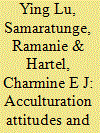

|
|
|
|
|
| Publication |
2013.
|
| Summary/Abstract |
The Australian workforce is becoming increasingly diverse and it is important to understand the role of individuals' acculturation attitudes in the workplace. The appreciation of the relationship between acculturation attitudes and affective workgroup commitment is critical for mangers to facilitate the performance of employees with diverse backgrounds. To gain a better understanding of this relationship, we assessed the acculturation attitudes of professional Chinese immigrants and the relationship between these attitudes and affective workgroup commitment in the Australian workplace. Our survey of a sample of 220 professional Chinese immigrants in the Australian workplace revealed that, even though many of them favor integration, the majority adopt separation and marginalization, which were found to be related with low affective workgroup commitment. This study underscored the importance of acculturation attitudes to cultivate positive job-related outcomes, and provided useful information for organizations to manage immigrant employees via effective acculturation programs.
|
|
|
|
|
|
|
|
|
|
|
|
|
|
|
|
| 2 |
ID:
117934
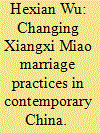

|
|
|
|
|
| Publication |
2013.
|
| Summary/Abstract |
This essay describes elements of Xiangxi Miao marriage practices such as courtship, wedding ceremonies, and marriages between the Miao and Han, exploring how Xiangxi Miao marriage practices changed at the turn of this century, and disclosing social influences on the changes in marriage practices. The author uses a Miao village of Zalun as a case study. Through participant observation and intensive interviews, it was found that, before 2000, Xiangxi Miaos' courtship practices and wedding ceremonies had strict processes and reflected agricultural rhythm. In addition, there were few marriages between the Miao and Han. Since the beginning of this century, Xiangxi Miao marriage practices have changed due to socioeconomic development, population mobility, and diverse communication between Miao young women and men. Dramatic shifts in marriage practices have produced social influences among Xiangxi Miao communities. The changes in marriage practices have promoted Xiangxi Miao free marriages, advancing social cohesion and acculturation. However, these changes have also increased numbers of criminals and problems of healthy growth and education of the stay-at-home children.
|
|
|
|
|
|
|
|
|
|
|
|
|
|
|
|
| 3 |
ID:
117930
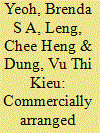

|
|
|
|
|
| Publication |
2013.
|
| Summary/Abstract |
Globalization and increased mobilities have multiplied cross-border transactions not only in the economic sphere but have also a major impact on human relationships of intimacy. This can be seen in the increased volume of differently mediated forms of international marriage, not just straddling 'east' and 'west', but within Asia and across different ethnicities and nationalities. International marriage raises a host of social issues for countries of origin and destination, including challenges relating to the citizenship status and rights of the marriage migrant. This paper examines the negotiation of citizenship rights in the case of commercially matched marriage migrants - namely Vietnamese women who marry Singaporean men and migrate to Singapore as 'foreign brides'. While they are folded into the 'family' - what is often thought of as the basic building block of the nation in Asian societies - they are not necessarily accorded full incorporation into the 'nation' despite Singapore's claims to multiculturalism. This is particularly salient at a point when cross-nationality, cross-ethnicity marriages between Singapore citizens and non-citizens are on the increase, accounting for over a third of marriages registered in Singapore in recent years. Vietnamese women who marry Singaporeans are positioned within the nation-state's citizenship regime as dependents of Singaporean men, having to rely on the legitimacy of the marriage relationship as well as the whims of their husbands in negotiating their rights vis-à-vis the Singapore state. Drawing on interviews and ethnographic work with 20 Vietnamese women who are commercially matched marriage migrants, the paper first focuses on the vulnerable positions these women find themselves, particularly given difficulties in forging their own support networks as well as weaknesses of the civil society sector in what has been called an 'illiberal democracy' characterized by a political culture of 'non-resistance'. The paper then goes on to examine the way they negotiate rights to residency/citizenship, work and children within webs of asymmetrical power relations within the family and the nation-state. We draw on our findings to show that citizenship is 'a terrain of struggle' within a multicultural nation-state shaped by social ideologies of gender, race and class and negotiated on an everyday basis within spheres of family intimacy.
|
|
|
|
|
|
|
|
|
|
|
|
|
|
|
|
| 4 |
ID:
117931
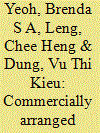

|
|
|
|
|
| Publication |
2013.
|
| Summary/Abstract |
Globalization and increased mobilities have multiplied cross-border transactions not only in the economic sphere but have also a major impact on human relationships of intimacy. This can be seen in the increased volume of differently mediated forms of international marriage, not just straddling 'east' and 'west', but within Asia and across different ethnicities and nationalities. International marriage raises a host of social issues for countries of origin and destination, including challenges relating to the citizenship status and rights of the marriage migrant. This paper examines the negotiation of citizenship rights in the case of commercially matched marriage migrants - namely Vietnamese women who marry Singaporean men and migrate to Singapore as 'foreign brides'. While they are folded into the 'family' - what is often thought of as the basic building block of the nation in Asian societies - they are not necessarily accorded full incorporation into the 'nation' despite Singapore's claims to multiculturalism. This is particularly salient at a point when cross-nationality, cross-ethnicity marriages between Singapore citizens and non-citizens are on the increase, accounting for over a third of marriages registered in Singapore in recent years. Vietnamese women who marry Singaporeans are positioned within the nation-state's citizenship regime as dependents of Singaporean men, having to rely on the legitimacy of the marriage relationship as well as the whims of their husbands in negotiating their rights vis-à-vis the Singapore state. Drawing on interviews and ethnographic work with 20 Vietnamese women who are commercially matched marriage migrants, the paper first focuses on the vulnerable positions these women find themselves, particularly given difficulties in forging their own support networks as well as weaknesses of the civil society sector in what has been called an 'illiberal democracy' characterized by a political culture of 'non-resistance'. The paper then goes on to examine the way they negotiate rights to residency/citizenship, work and children within webs of asymmetrical power relations within the family and the nation-state. We draw on our findings to show that citizenship is 'a terrain of struggle' within a multicultural nation-state shaped by social ideologies of gender, race and class and negotiated on an everyday basis within spheres of family intimacy.
|
|
|
|
|
|
|
|
|
|
|
|
|
|
|
|
| 5 |
ID:
117932
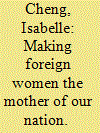

|
|
|
|
|
| Publication |
2013.
|
| Summary/Abstract |
Citizenship awarding is politicised. Conceiving female marriage migration as a national threat, Taiwan's citizenship legislation is consciously designed and purposefully utilised to achieve exclusion and assimilation. Driven by a nationalistic impetus, it shows how Taiwan imagines itself as a modern, prosperous and homogenous nation and projects upon the immigrant outsiders as a threat to its self-identity. Examined through immigrant women's lived experiences, this citizenship legislation is biased by gender, class and ethnicity. The implementation of the legislation is not only an example of symbolic politics but also banal nationalism realised at grassroots level in the private domain. Immigrant women's lived experiences show that exclusion and assimilation stemmed from banal nationalism is not just an operation of symbolic politics but is also enmeshed with their everyday life.
|
|
|
|
|
|
|
|
|
|
|
|
|
|
|
|
| 6 |
ID:
117933


|
|
|
|
|
| Publication |
2013.
|
| Summary/Abstract |
By investigating the regulation differentials between Chinese spouses and foreign spouses in Taiwan's marital immigration program, this article shows how a restrictive border policy reflects the characteristics of Taiwan's contemporary nationalism. This article notes that the similarities in language, culture and ethnicity are not key elements in the construction of Taiwan's contemporary nationalism. Instead, the uncertain condition of sovereign identity constitutes the nationalist agenda in Taiwan. Taiwan's nationalism is accordingly contingent upon the discursive externality of a Chinese spouse. The discrimination against Chinese spouses is primarily politically motivated.
|
|
|
|
|
|
|
|
|
|
|
|
|
|
|
|
| 7 |
ID:
117936
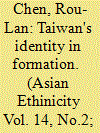

|
|
|
|
|
| Publication |
2013.
|
| Summary/Abstract |
The formation of Taiwanese identity is a good example to make sense of the theoretical debate between primordialism and constructivism. Based on the two-level multinomial logit results, this paper proves that primordial ethnicity in Taiwan becomes less salient; rather, changing sociopolitical contexts turn out to be the dominant factor in shaping ethnic identity. Specifically, it indicates how the democratic transition has brought about various types of mechanisms, which smoothly disenchant the dominant Chinese identity. As the Taiwanese renaissance emerges to take a leading role in Taiwan's political platform, ethnic identity might be reshaped in accordance with this mainstream Taiwanese ideology. This study also shows that reformation of ethnic identity in Taiwan relies as much on cognition of state boundaries as on the evaluation of political-economic conditions on both sides of the Taiwan straits.
|
|
|
|
|
|
|
|
|
|
|
|
|
|
|
|
|
|
|
|
|